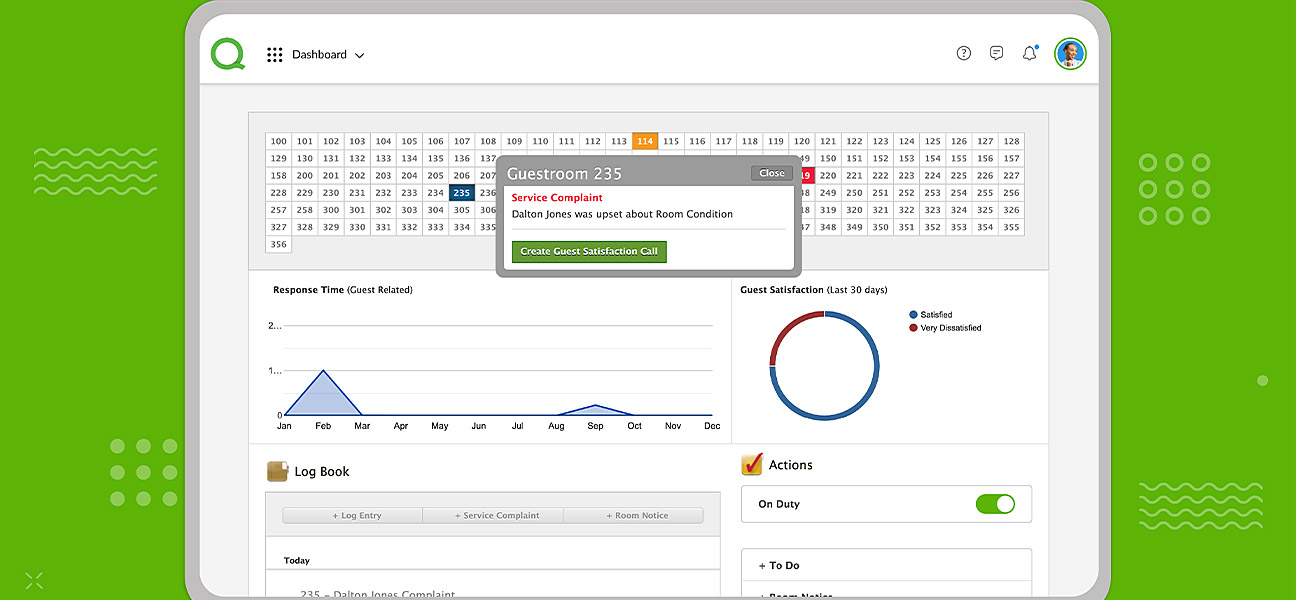Most people love surprises, but not everyone, especially a hotel GM who has just found out a guest complaint after it’s become a crisis.
Fortunately for many, including all hotels managed under National Hospitality Services (NHS), a digital approach from Quore makes it so that a burst pipe in a guest’s room doesn’t burst a GM’s bubble.
Kelly Haas, director of training and development, NHS, uses Quore’s software at all 40 of her company’s properties. “The biggest part of it is communication,” she said. “Because our guests today and our associates, they want to know why we’re doing something when we’re doing something and then they want that closure on it. And that’s what Quore is really going to give you when it comes to that communication piece and knowing what’s going on.”
She said that before using the system, employees did not have a central system to log when incidents that a GM would want to know about would happen. “Gone are the days of pass-on logs and Post-it notes and really long pass-on emails and all that kind of stuff,” she said. “What I liked about it as a manager is that I know what is going on at my property even when I am not there. I knew when I woke up in the morning and the first thing—besides looking at my revenue, my numbers—the next thing I was looking at Quore. You have that pass-on log, you have those guest complaints, you have the open work orders. And so as a manager I know what I’m walking into.”
The system keeps issues from falling through the cracks or escalating. “I’m walking in there saying, ‘Hey, I know Mr. Smith was really upset last night. I’m so sorry about that,’” said Haas. “’Let’s get him on the phone right now. Let’s go ahead and solve that complaint.’ That takes care of not only my associates, so they have the empowerment—they know that they have that backup. They have that support on there, but also that guest isn’t waiting days [for the issue] to be taken care of.”
If, for example, a guest has an issue in their room that requires maintenance, an employee will enter it into the system. That will send a push notification to the property’s engineering team, as well as one to the manager. If the issue is not settled within a specified timeframe, another notification is sent to more people on the team.
“My first goal is that we need to close out the work order,” she said. “The second is following up with the guest with a call that’s going to say, ‘I’m so sorry this happened in your room. I see maintenance already closed it out. Is everything good?’ Then you’re also going to get a manager follow-up.”
The guest gets that call before they check out and receive a guest satisfaction survey. “All that’s going to be handled right then and there,” said Haas. “And that’s what I love about it.”
Scott Schaedle, CEO, Quore, said that this system can help deal with the inevitable. “Things break in a hotel, it’s a constant problem. But the trick to it is the hospitality aspect of it. If you can put the right information in the right person’s hand, they can handle the complaint or the issue before it comes to the point it becomes something bigger.”
Earlier in his career, Schaedle worked as a maintenance engineer at a hotel and saw firsthand what a lack of foreknowledge about a problem can be. “My GM walked into that guest who was waiting there to ambush and he had no idea what he’s walking into,’ he said. “And I was like, ‘How great would it be to have a system to warn what he’s about to walk into before he actually gets the hotel?’ So that was one of the first things I built before the product came on the market. brought it to market sure to help split communicate it out because I always knew that as Paul he was trying to prepare before he came to the hotel, but these this information just wasn’t available to him.
He continued, “If you’re getting ambushed by a guest, you’re on the defensive immediately. So, your responses are going to be from a defensive standpoint. But if you have that information before you get there, you’ve already thought about what the resolution may be.”
